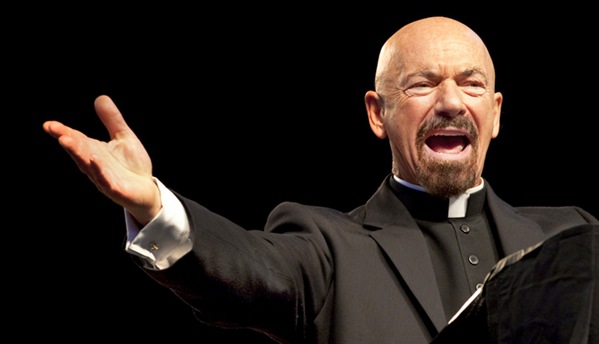Ever since the Council of Trent, Catholic theologians have tended to view the Lutheran position on justification (and sometimes, among armchair theologians, the entire Reformed tradition) as a “legal fiction.” Canon 11 makes the point:
If anyone says that people are justified wither solely by the attribution of Christ’s justice, or by the forgiveness of sins alone, to the exclusion of the grace and charity which is poured forth in their hearts by the Holy Spirit and abides in them; or even that the grace by which we are justified is only the good-will of God: let him be anathema (Tanner, Decrees of the Ecumenical Councils, 679)
In context, the “attribution of Christ’s justice” is what Lutheran and Reformed theology calls “imputation,” the forensic crediting of Christ’s righteousness to the believer. Catholics of the sixteenth-century protested that in the doctrine of forensic imputation Protestants were guilty of reducing justification to a legal category that merely called one righteous without producing any real change (hence the term “legal fiction”). Accordingly, the Council of Trent opposed Luther’s “justification by faith alone” by citing Galatians 5:6, “fides quae per caritatem operatur” (faith which works through love), which was then translated into Aristotelian categories as “fides caritate formata” (faith formed by love). Although there have been exceptions among some Catholic scholars who advocate on behalf of imputation (e.g., Petavius, Scheeben, Newman, Rahner, Küng), most understand the one formal cause of justification to be (solely) an internal deposit of faith working through love.
Catholics in the News
It is not my purpose in this post to defend the Protestant position of forensic imputation. I hope to do that in the future with reference to Catholic sources such as those mentioned above. In this post I want to consider whether the Catholic Church is vulnerable to the accusation of holding a legal fiction of its own. Here is the issue.
This past week I read two separate articles in the newspaper about significant moral failure among Catholic clergy. The first was in Reuters concerning the steady stream of leaked documents from the Vatican (so called “Vatileaks”), which have revealed an unholy nest of conspiracies, backstabbing, and ambition among upper level prelates. Charges of financial impropriety figure prominently in the scandal, such as letters from an archbishop to Pope Benedict warning of “corruption and abuse of power” in Vatican finances. The other story reported on the sentencing of the first Roman Catholic official in the U.S. to be convicted of concealing sexual abuse of children by priests. Judge M. Teresa Sarmina said that Monsignor William J. Lynn, age 61, had allowed “monsters in clerical garb” to “destroy the souls of children, to whom you turned a heard heart.” Lynn had been a former Cardinal’s aide and one of the highest-ranking officials in the Archdiocese of Philadelphia.
I mention this with some hesitation. As a policy, I avoid writing about moral failures in the Catholic Church. We Protestants have more than our own share of moral failure and shame on us for showcasing the spec in our brother’s eye when we have a forest of logs in our own. But in this instance, I want to raise a theological question that has bearing on a central issue in the conversation among Catholics and Protestants.
The Catholic Legal Fiction?
Catholics may eschew what they consider to be a legal fiction in the doctrine of justification, but I wonder if they have something of their own ecclesial version. According to Catholic teaching, there is a proper distinction between the office of a priest and his personal piety. The former is the sancta (the holy thing) and the latter is the sancti (the holy person). As a result, an ordained priest, according to the Sacrament of Holy Orders, is a “priest forever” (Hebrews 7:17), an identity that is unassailable. This is, for instance, how Catholic historians typically explain spiritual malnourished Popes of the fifteenth and sixteenth centuries, such as Pope Sixtus IV (1471-1484), Innocent VIII (1484-1492), Alexander VI (1492-1503), Pius III (1503), Julius II (1503-1513), Leo X (1513-1521) and Clement VII (1523-34). Certain rights and privileges of the clerical position may be withheld, but the office is permanent. Here is how the Catechism of the Catholic Church states it, followed by a citation from Canon Law:
1583 It is true that someone validly ordained can, for grave reasons, be discharged from the obligations and functions linked to ordination, or can be forbidden to exercise them; but he cannot become a layman again in the strict sense, because the character imprinted by ordination is for ever. The vocation and mission received on the day of his ordination mark him permanently.
According to Canon Law 290, “After it has been validly received, sacred ordination never becomes invalid.”
Notice what is happening here. According to Catholic teaching, there are two categories: lay and ordained. Sacramental grace is understood to sanctify the latter of these in such a way that it is distinct (though not separate) from faith working through love. In other words, a priest’s moral life can fail miserably without the validity of his priesthood ultimately being impugned by his behavior. From my perspective, this logic is remarkably similar to the way Protestants define our doctrine of justification by forensic imputation. Of course, they are different doctrines, but they bear a resemblance in the way our actual righteousness is distinct from the judicial state in which we stand before the living God.
At the end of the day, the important question is which forensic vision is taught by Scripture. Is it the ordained priest (as Catholics assert) or the one whose identity is crucified with Christ and raised to the heavenly realm (Protestantism). The answer, of course, will be debated by Catholic and Protestants until our Lord Jesus returns. But in the meantime, let us recognize that both of our theological traditions make significant use of the forensic category.





